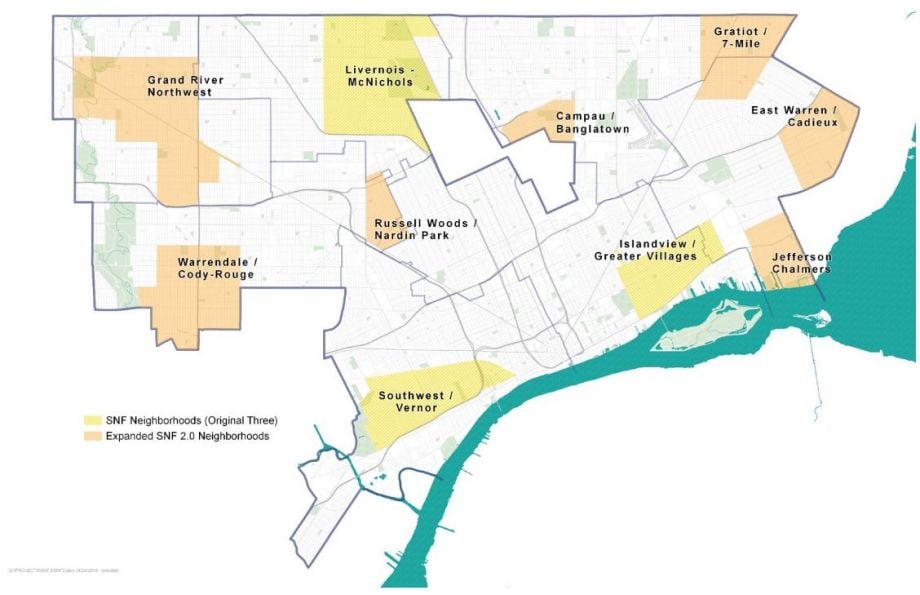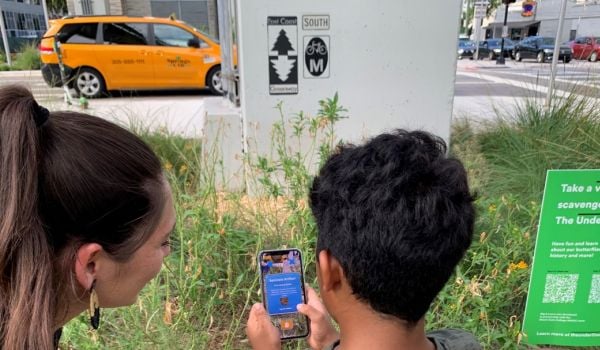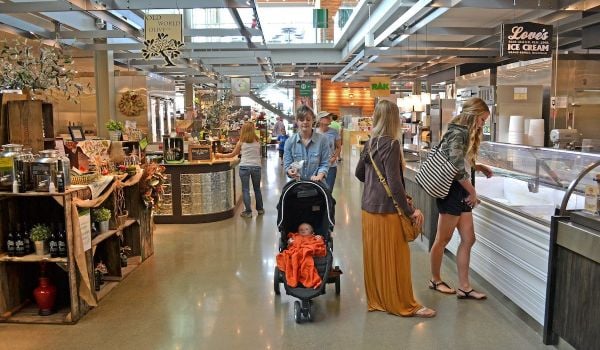Under the leadership of co-founder and managing partner, David Alade, Century Partners has been serving as part of a city-selected team to rehab over a hundred homes and landscape nearly 200 vacant lots in Detroit’s Fitzgerald neighborhood, closer to the northern edge of the city than to the downtown and midtown areas that have seen a wave of investment yet to come to the rest of Detroit.
“Detroiters aren’t any different from folks who live in cities across the country,” Alade says.
“They want safe neighborhoods. They want activated homes. They don’t want to walk by or drive by blight. They want to be able to access high-quality retail within walking distance. And they want close-knitted and connected neighborhoods where people know each other.”
Alade says that the RFP process to join the project required intensive community engagement, and that the team has worked closely with Fitzgerald residents and representatives from nearby universities in the time since his firm was selected to do the work. Michelle Bolofer, who has led a nonprofit offshoot of Century Partners called Century Forward since March, says she’s been working to build a network of stakeholders in the project and help create workforce opportunities for Fitzgerald residents.
Detroit now hopes to build on the strengths of that work, announcing $130 million in new investments in neighborhood development and public spaces across Detroit. The funding will expand the city’s Strategic Neighborhood Fund, which previously invested $42 million in three areas including the Fitzgerald revitalization project, to seven more areas across the city.
The money will come from a combination of philanthropic and corporate donations as well as state, local, and federal funds, the city says. The bulk of the investment — around $100 million — would be split between streetscape improvements on neighborhood commercial corridors and gap financing for commercial and mixed-use development in the same areas. The fund, which the city is calling Strategic Neighborhood Fund 2.0, would also invest $21 million in park improvements, $7 million in rehabbing vacant homes, and $3 million in neighborhood planning efforts.
The announcement comes a little more than three years after Detroit’s emergence from bankruptcy, and just days after regaining local control of its finances and government operations for the first time in decades. Earlier this year, the city also announced that it would raise $250 million to invest in developing 2,000 new affordable units and preserving 10,000 more over the next five years.
“Our big vision here is inclusive growth,” says Ryan Friedrichs, chief development officer for the City of Detroit. “What we’re trying to do differently here in Detroit is have an affordable housing strategy in lockstep with the economic growth strategy, so that we’re not having any residents displaced as we grow.”
In the Fitzgerald neighborhood, for example, the Strategic Neighborhood Fund 1.0 invested in a strategy of rehabbing homes, creating a new park, and improving every publicly owned vacant lot in the area. The work is expected to result in a continuous greenway that connects the neighborhood to the University of Detroit Mercy and Marygrove College.
Overall, the new phase of the Strategic Neighborhood Fund lines up with much of the community planning work that’s been done in the past, says Tom Goddeeris, deputy director of Detroit Future City, the group that helped shape a long-range strategic framework for the city’s development. Specifically, the Fund is aimed at drawing the strength of the development market in the downtown core into the outlying neighborhoods, Goddeeris says.
“The strategy is based on the idea that you need substantial upfront investment to reignite the market in these various neighborhoods, and the city is trying to be very explicit about doing development in those neighborhoods in a way that is inclusive and will not displace current residents,” Goddeeris says. “And of course, that’s a challenge if you rely on market-based solutions.”
Friedrichs also says that the Strategic Neighborhood Fund also works in tandem with the Entrepreneurs of Color Fund, a business loan program supported by JP Morgan Chase and the W.K. Kellogg Foundation. And some 70 percent of grants from the Motor City Match Program, which helps business owners find real estate, have gone to minority- or women-owned businesses, according to Friedrichs.
The expansion of the Strategic Neighborhood Fund is meant to bring investments in neighborhood commercial corridors and public space to a new scale. As part of the announcement for the expansion, the Kresge Foundation, which has offices in Detroit and Troy, Michigan, said that it would contribute the first $15 million to the philanthropic side. Rip Rapson, president of the Kresge Foundation, says the investment is closely aligned with the foundation’s previous work in the city.
In a survey released by Kresge last week, 93 percent of residents who responded said retail districts should be a priority for the city’s investments.
The fundraising goal is ambitious, Rapson says. If the city is going to raise an additional $45 million from other philanthropic foundations in the region, those foundations are going to have to make tough decisions. In some cases, investing in the Strategic Neighborhood Fund may mean smaller foundations have to pull back on other investments they’re in the habit of making.
“It’s a good push,” Rapson says. “I think the mayor is absolutely right to push us on this question.”
Rapson says that the Kresge Foundation is more confident in making large-scale investments now because he believes in the leadership team the mayor has assembled, especially planning director Maurice Cox, housing director James Arthur Jemison, and Jed Howbert, who leads economic development efforts.
“The deepening of neighborhood engagement in the work of neighborhood revitalization has given us a higher level of confidence that the moneys that we will spend are going to be spent in a way that seems consistent both with city priorities and with neighborhood priorities,” says Rapson.

Jared Brey is Next City's housing correspondent, based in Philadelphia. He is a former staff writer at Philadelphia magazine and PlanPhilly, and his work has appeared in Columbia Journalism Review, Landscape Architecture Magazine, U.S. News & World Report, Philadelphia Weekly, and other publications.
Follow Jared .(JavaScript must be enabled to view this email address)







_600_350_80_s_c1.JPEG)








